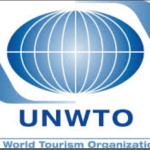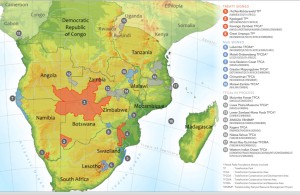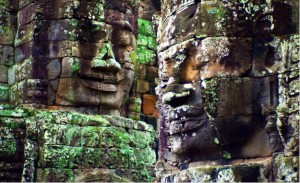. SUSTAINABLE DEVELOPMENT .
an article by Bea Broda, TravelTv for E Turbo News (abridged)
Taleb Rifai, the Secretary General of the United Nations World Tourism Organization (UNWTO) is in Johannesburg today at the International Institute for Peace Through Tourism (IIPT) Symposium.

Click on the photo to enlarge
He said when speaking on Peace Through Tourism:
“The topic of this symposium is quite relevant. We only need to read the headlines every day to be reminded of how much we are in shortage of peace and peace building. . .
“Tourism was created as a way to foster peace and understanding. No place is not visited and rights to travel cannot be denied. More than 1.1 billion people traveled in the last year, and that is a revolution into the “age of travel.” Ten million visit S. Africa in a year, and each of us is a potential ambassador of peace and we can help break down cultural barriers. Peace is at the heart of the UNWTO. The UN is built of social progress, peace and human rights, and UNWTO was put in place in 2003 to help build peace through tourism. Peace can inspire change. A more peace sensitive tourism sector can be built, by engaging and respecting local communities.
“We need to travel to learn and not condescend, and tourism must be considered at the community level. Local populations should be associated with tourism activities and share in the benefit of tourism.
“Tourism, culture and sports represent the most viable peace building and sustainable sectors, but also the most viable economically, surpassing the economy based on production. Amazing benefits are created by sports, for example, and tourism needs to be seen as a development tool.
“Three ways tourism can do this:
“1. Tourism builds respect and mutual understanding and sparks billions of encounters that are steps towards understanding. It builds our education and it can be peace sensitive and makes travelers global citizens.
“2. Tourism improves livelihoods and creates many jobs. It can help communities value their place in the world and what they have to offer. It can help people value their music, art, gastronomy, etc.
“3. Tourism leads to reconciliation within and between societies. It can open up peoples’ minds to other visitors. A great example is how FIFA in South Africa galvanized people together. If only all the wars in the world could be settled this way – with sports! Compete and hug each other after the game.
“1.8 billion people will be traveling by 2020. This is a good world, and we shouldn’t listen to the negative people that speak of such future terror. The IT revolution has also helped to bring us together – the world has never been better! We have never cared more about each other. For example, the kidnapping of the girls in Nigeria became a concern for all of us, as do tsunamis and wars wherever they are. We all care about these things, and we all wish to deliver a better world to our children than the one we started with. Tourism can help foster this.”
How can tourism promote a culture of peace?
Comment by Liliana Mota, October 23, 2013
Can tourism be seen as an instrument to achieve complicity between people’s minds?
“There is nothing better that connects two people’s mind than a good conversation” The above quote could be used to describe the effect which tourism has on people. Like a great conversation, tourism could be said to play a vital role amongst people all over the world. It fosters communication in all its senses, intercultural dialogue and mutual understanding.
In today’s world it is evident that there is a shortage of moral or ethical values amongst people across the different nations in this world, resulting in a globalised world lacking these morals and ethical values. Ignorance, the failure to consider the needs of others, and selfishness are a few of the ways which hinder us from embracing diversity and a common human perspective, which would result informal empathy, internal moral compassion, tolerance of differences, historical consciousness and interpretation. The above mentioned features are intrinsic, inherent and can be found in the practice of tourism.
Tourism has been emphasized as one of the most effective instruments which continue to tackle to tackle social and economical poverty, as well as encourage the culture of peace practice amongst people. In looking at the UN architecture, one is able to see the growing implications which the tourism sector has on the world and world policies. The touristic phenomenon has achieved a world record of 5% of world’s GDP contribution and is responsible for 235 millions jobs, according to the UNWTO’s data. Often the tourism sector counts more than 20% of the countries’ GDP.
On the negative side of this, it is evident that tourism focuses on economical matters, depriving any focus on the global implications of the constant interaction tourism encourages.
In the literal sense, tourism is nothing more or less than people meeting with the willingness to understand each other’s differences and point of view and simultaneously creating the opportunity for dialogue, mutual understanding and peace to take place.
Apart from tourism, various factors could be seen to play a role in encouraging integration and diversity amongst societies across the world. For example, the cultural segment has played an essential source of people’s integration and inclusiveness in developing countries.
Education has also played a significant role in encouraging integration, and incorporation amongst people all over the world. Education has been reconsidered and proposed to being the catalyst for exchange between countries, cultures and sectors, and most importantly for enhancing the lives of people by granting them the opportunity to leave their poverty stricken lives and societies in exchange a for better future which includes job and exchange opportunities.
In the tourism world, differences play the most essential role, differences among people represents the added-value. Being different is always a positive factor that usually motivates and encourages people to get to move and engage with each other and embrace the differences with the use of spiritual, religious and cultural meanings.
This notion of tourism needs to be addressed in multilateral governance discussions, where all the main actors, the international community, the ministerial and experts, private sector, local institutions and civil society engages are all present, and are all willing to work together in combined efforts and initiatives (from poverty alleviation to the promotion of awareness of sustainable development addressing special needs like regional development, urban planning and protection of natural and cultural landscapes). This combined approach of working at the local level within communities and at the national and international level, in order to reach and engage the poor, has been considered as potentially being the “one possible and effective answer” and effective approach towards the world’s poorest areas where it can make a difference.


